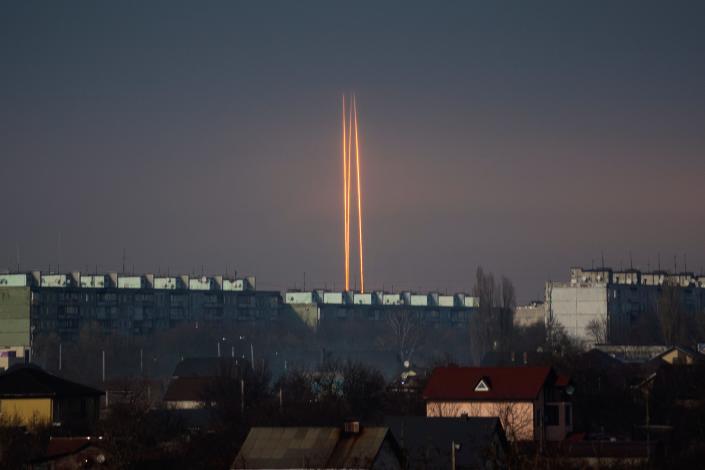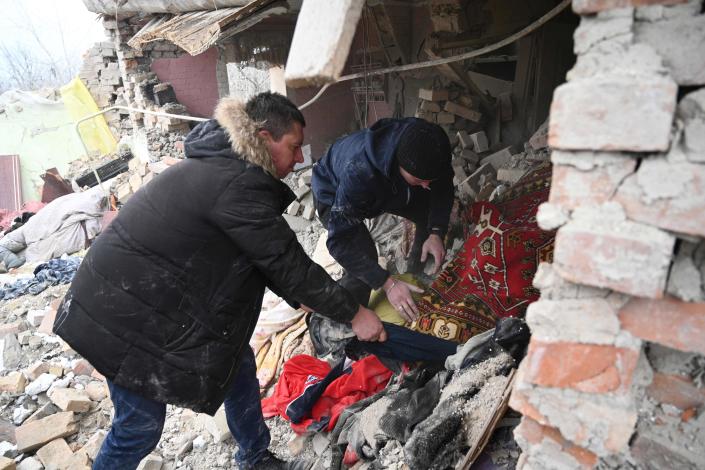[ad_1]
Slovakia on Thursday joined Poland in urging their allies to provide fighter jets to Kyiv as a wave of deadly “retaliation” strikes rocked Ukraine.
“I think it’s time to make a decision,” Slovak Defense Minister Jaroslav Nad said on Facebook. “People in Ukraine are dying, we can really help them. … This is inhumane and irresponsible.”
A day earlier, Polish President Andrzej Duda told CNN that Poland was ready to provide Ukraine with the MiG-29 fighters as part of a package involving other Western allies.
“The training of Ukrainian pilots is important and much needed,” Duda said, adding that long-range artillery also is needed “to push the enemy back and avoid direct clashes. Because the Russians are trying to crush Ukraine, crush it with the weight of their armed forces, their size and their equipment.”
The Biden administration, and NATO, thus far have declined Ukraine President Volodymyr Zelenskyy’s requests for aircraft.
LAWMAKER DECLINES INVITE TO KYIV: House Speaker Kevin McCarthy declines President Volodymyr Zelenskyy’s invite to visit Ukraine

Developments:
►The Biden administration unveiled it’s 2024 budget proposal, which calls for almost $7 billion in additional spending for Ukraine and other allies to combat “Russian aggression.” The U.S. has spent more than $75 billion on Ukraine since the war began a year ago.
►An air raid warning sounded Thursday on Moscow radio stations and TV channels but was a false alarm, a result of server hacking, state-run Tass reported.
►52% of Ukrainians don’t want any Russian taught in schools, up from 8% in a 2019 survey, according to a new poll by the Kyiv International Institute of Sociology. Despite the war, 42% of the population still favors some Russian being taught – although only 6% want it taught more than other foreign languages.
►A group of 42 retired Canadian Olympians are urging their country’s Olympic leaders to take a stand against Russians participating in next year’s Paris Games.
ANATOMY OF AN INVASION: Mapping and tracking Russia’s invasion of Ukraine
Russian ‘retaliation’ drones, missiles engulf Ukraine
A wave of Russian “retaliation” missiles and drones swept across Kyiv and other Ukrainian cities Thursday, killing at least six people and knocking out power to hundreds of thousands in one of the biggest attacks on the besieged country this year.
At least seven people were injured, authorities in the regions of Kyiv, Lyiv and Dnipropetrovsk said on their Telegram channels. Sites in Kharkiv, Mykolaiv, Odesa, Zhytomyr and Kirovohrad also were struck. President Volodymyr Zelenskyy described “a difficult night” as the barrage struck crucial infrastructure facilities.
The Russian Defense Ministry said the strikes were in retaliation for a March 2 incursion into the Bryansk region of western Russia by what Moscow claimed were Ukrainian saboteurs. A ministry summary said its strikes hit “key elements of Ukraine’s military infrastructure, enterprises of the military-industrial complex, as well as energy facilities that provide them.”
Russia launched 81 missiles and eight exploding, Iranian-built Shahed drones, Ukraine military officials said. Thirty-four cruise missiles and four drones were intercepted, they said.
Foreign Minister Dmytro Kuleba tweeted: “No military objective, just Russian barbarism. The day will come when Putin and his associates are held accountable.”
At the end of January, 11 people were killed when Russia’s military unleashed missile attacks across Ukraine the day after the U.S. and Germany said they would provide Ukraine’s military with modern tanks.
Dig deeper: Biden, in annual budget, asks Congress for more aid to Ukraine as Russia pushes ahead with war
$58 billion in Russian assets frozen by global task force
A multinational task force aimed at implementing the sanctions imposed against numerous Russian businesses and individuals has blocked or frozen more than $58 billion worth of assets, tracked sanctioned assets across the globe, and heavily restricted the sanction targets from the international financial system, the U.S. Treasury Department announced Thursday. The group also has collectively worked to investigate and counter Russian sanctions evasion, including attempts to hide assets, cryptocurrency and money laundering schemes, Russian defense procurement, the department said in a statement.
The Russian Elites, Proxies, and Oligarchs Task Force includes the Eureopean Union, and Australia, Canada, France, Germany, Italy, Japan, the United Kingdom and the United States.
Ukraine official dismisses NATO warning that Bakhmut could soon fall
A high-ranking Ukrainian military official on Thursday dismissed warnings from NATO chief Jens Stoltenberg that the hotly contested city of Bakhmut could soon fall to the Russians. Col. Serhiy Cherevaty, spokesman for Ukraine’s Eastern Group of Forces, said NATO does not fully understand that Ukrainians have developed “much greater stability and power of tactical solutions” as the war has dragged on, he said.
“They approach this purely pragmatically with dry calculations,” Cherevaty said. “I think that NATO is studying this, and they need to study it all further. I think that such statements should be treated with respect, but with the understanding that they do not fully understand the whole situation.”
US judge approves seizure of $25M Boeing 737
A federal court in New York has authorized the seizure of a $25 million Boeing 737 owned by a Russian energy company, citing U.S. sanctions against Russia in response to its invasion of Ukraine. The aircraft is owned by PJSC Rosneft Oil Co., headquartered in Moscow and led by sanctioned oligarch Igor Ivanovich Sechin.
The plane was last in the United States in March 2014, and is now believed to be in, or traveling to or from, Russia, Brooklyn U.S. Attorney Breon Peace said in a news release. It was not immediately clear when or how the jet could be seized.
“Today’s enforcement action demonstrates there is a price to pay for Russian companies and oligarchs that flagrantly evade sanctions that the United States has imposed in response to the unjustified war against the people of the Ukraine,” Peace said, adding that his office will “relentlessly pursue the proceeds of unlawful conduct, be it on land, in the air, or at sea.”
Power lost, then returned to Europe’s largest nuclear power plant
Europe’s largest nuclear power plant lost all of its “off-site” power on Thursday after the latest Russian missile and drone strikes across Ukraine, according to the head of an international team monitoring the Zaporizhzhia Nuclear Power Plant. Rafael Grossi, director general of the U.N.’s nuclear watchdog the International Atomic Energy Agency, said all 20 of the site’s emergency diesel generators were activated as a result of the attacks. This is the first time the site, in southeastern Ukraine, has lost all power since November last year.
“This is the sixth time – let me say it again SIXTH time – that ZNPP has lost all off-site power and has had to operate in this emergency mode. Let me remind you – this is the largest nuclear power station in Europe,” Grossi said in a statement. “What are we doing? How can we sit here in this room this morning and allow this to happen? This cannot go on.”
Electricity transmission system operator Ukrenergo later announced it had restored power to the plant. Since Russia’s invasion of Ukraine, each side has accused the other of shelling the Zaporizhzhia plant.


Contributing: The Associated Press
This article originally appeared on USA TODAY: Ukraine Russia war live updates: Missiles, drones pound Ukraine
[ad_2]
Source link
